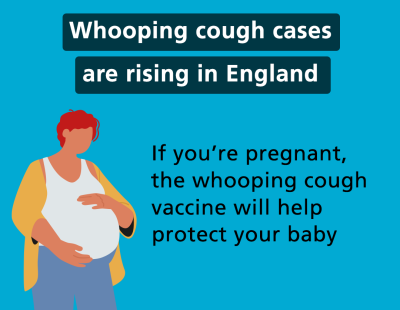Cases of whooping cough (also known as pertussis) are on the rise. Whooping cough is a bacterial infection that affects your lungs and breathing tubes. It spreads very easily through coughing and sneezing and can sometimes cause serious problems.
It's important for babies and children to get vaccinated against whooping cough. If you are currently pregnant, you can contact your midwife or GP surgery to get vaccinated.
Getting vaccinated while you're pregnant is a highly effective way to protect your baby from developing whooping cough in the first few weeks of their life.
Parents can also help protect their children by ensuring they have received the vaccination as part of their NHS vaccination schedule. If you are not sure if your child has had all their routine vaccinations, check their personal health record (Red Book) or contact your GP practice.
If they have missed any of the vaccinations, make sure they catch up as soon as possible.
The signs of whooping cough to look out for:
The first signs of whooping cough are similar to a common cold, such as a runny nose, sore throat and a mild fever. After about a week or two you or your child will experience:
- coughing bouts that last for a few minutes and are worse at night
- a "whoop" sound – a gasp for breath between coughs (young babies and some adults may not "whoop")
- difficulty breathing after a coughing bout and may turn blue or grey (young infants)
- you/your child may bring up a thick mucus, which can make you vomit
- you/your child may become very red in the face (more common in adults)
Babies under three months old who are not fully protected through immunisation are at the highest risk of developing severe complications. This could include trouble with breathing while sleeping,inflammation of the lungs, dehydration, or seizures. The The best defence is to make sure they are fully vaccinated.
Ask for an urgent GP appointment or get help from NHS 111 if:
- your baby is under 6 months old and has symptoms of whooping cough
- you or your child have a very bad cough that is getting worse
- you've been in contact with someone with whooping cough and you're pregnant
- you or your child has been in contact with someone with whooping cough and have a weakened immune system
David Herne, Director of Public Health at Warrington Borough Council said: “With cases of whopping cough on the rise, it’s important to take up the whooping cough vaccine if you are pregnant to protect your baby from becoming ill. Residents can book a vaccine through their GP surgery or their local maternity service.
“I would also encourage parents to check their children’s red book to ensure they haven’t missed this vaccine and catch up as soon as possible if they have.”
To help prevent the spread of bacteria that causes whooping cough and other respiratory illnesses, remember to cover your mouth and nose with a tissue when you cough or sneeze. Throw used tissues into a bin right away and wash your hands often with soap and water, and dry thoroughly.
For more information on whooping cough and the vaccine please visit - nhs.uk/conditions/whooping-cough/
